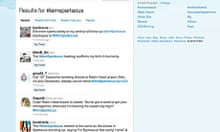Thursday was a bad day for free speech. It came to light that a plastic surgeon has been threatened with a libel action for expressing concerns and scepticism about a breast enhancement cream (no, really!) and we read reports of the RSPB being sued for libel by two people for criticisms one of its scientists made of a study they carried out on baby grouse in Wales (yes, seriously!).
But also in the crown court in Doncaster, Paul Chambers lost his appeal over a Twitter joke. The facts of this case have been well narrated by David Allen Green among others. His message, which appears on the screens of his 600 followers if they are watching, said: "Crap! Robin Hood airport is closed. You've got a week and a bit to get your shit together otherwise I'm blowing the airport sky high!!!" This was born of his frustration that his plans to meet a woman (now his girlfriend) in Belfast were being crushed.
Neither the airport nor the local police appeared to consider it a serious or credible threat, but he has been convicted for sending a menacing communication. The judge was of the view that there was no humour involved, as she said the tweet was "menacing in its content and obviously so. It could not be more clear. Any ordinary person reading this would see it in that way and be alarmed."
The world of Twitter is dismayed as judged by the fact that the hashtag (label) used by those making short comments (tweets) has been among the top trending (popular) in this country since the verdict and that at its peak about a thousand tweets each hour are listed on that discussion, most of them expressing outrage and concern. Hundreds of people have re-issued the original offending message under the hashtag "I am Spartacus" in an effort to challenge hundreds of prosecutions, seek to show defence of the judgment or show solidarity.
It is important to recognise that Twitter is not necessarily a reflection of the views of the off-line world, nor that everyone who uses social media would agree with the anger and concerns of those on Twitter about this case. In addition the written judgment is not yet available to scrutinise. However, many both inside and outside the internet world will be rightly concerned about this case – not just whether it was an injustice on the facts, but that there may be more prosecutions and that it may have a chilling effect on expression.
The police have used the same law to arrest Birmingham councillor Gareth Compton. He is widely reported as having tweeted: "Can someone please stone Yasmin Alibhai-Brown to death? I shan't tell Amnesty if you don't. It would be a blessing, really." He has also been suspended from the Conservative party indefinitely. It looks as if a rightwing politician has called for the stoning of a Muslim woman. But all is not what it seems. Similarly, it may seem at first sight that his case is much harder to defend than that of the airport bomb joke but closer examination suggests this is not the case, even if he is a less popular figure to the liberal internet than the geeky apolitical Chambers.
First of all, his tweet was not exactly what the Guardian reports. But as the Telegraph reports it included the hashtag "#R5L" at the end. This would alert those who see the tweet to the fact he is responding to something he had just heard on Radio 5 Live. In other words, it provides important context.
Second, Alibhai-Brown had, on the 5 Live programme, been arguing, in the context of David Cameron's China visit, that no western politician who supported the war in Iraq had neither the moral authority to lecture China about human rights nor lecture Iran about stoning. Compton clearly thought this was a ridiculous point and expressed that view aggressively and clumsily via his tweet.
Similar things are said about public figures all the time on twitter because the impersonal nature of the medium encourages some people to show off or try to grab attention or vent by using hyperbole, obscenity and provocative language.
What set this apart was that the public figure named objected to it (and this is entirely understandable) and also the tweeter was a politician. The combination of these two factors led to a reaction on Twitter itself that made Compton realise that he had he offended, to delete the tweet and to apologise. That could have been the end of the matter save that political parties are liable to take punitive action in the current climate, and the electorate can give a view in due course.
However, Alibhai-Brown was so concerned and/or upset that she expressed the view that it should be reported to the police and although she may not have done so herself, this then happened. The basis for wishing this to be done was variably given in the media as incitement to murder, incitement to racial hatred or incitement to religious hatred. But his action was patently none of these.
He could have been investigated under sections 4, 4a or 5 of the Public Order Act. These are widely cast especially in the case of section 5 as I have argued before. Section 5 is also over-policed – something that Anne Widdecombe and I agree on – but in the case of Gareth Compton, the police have indicated that he was arrested under suspicion of a breach of section 127 of the 2003 Communications Act – Improper use of public electronic communications network. This law is an updating of the 1984 Telecommunications Act, section 43.
This was the same section which Paul Chambers has been convicted of breaching. Under subsection 1(a) it specifies that "a person is guilty of an offence if he sends by means of a public electronic communications network a message or other matter that is grossly offensive or of an indecent, obscene or menacing character". This is not merely the internet equivalent of one of the public order offences. In some senses it is narrower in that intention is required, so that the sender must know, or not be reckless as to, the character of the tweet. It is also narrower in that it does not refer to insult and abuse which can be very subjective in religious matters.
However in other ways it is potentially broader as it does not require anyone to have been (or to be likely to have been) harassed, distressed or alarmed, let alone for that reaction to be reasonable. Clearly the judge or magistrate needs be satisfied that it is of the relevant offending character.
This law is rarely used, and indeed the Chambers case may be the first example of the "menacing" aspect being raised. As far as I can see, the term menacing is undefined in law while in contrast there is a reasonably high threshold for "obscene" or "grossly offensive" established in case law.
Whether a tweet referring to blowing up an airport or asking that someone be stoned to death is menacing or not critically depends on the context, including whether or not it was meant in jest or merely as a rhetorical flourish and whether it actually constituted a real menace rather than a potential one. It is to be expected that the judge in the Chambers case will explain in her written judgment why she considered the words to be a menace despite the context and explanation set out by the defence. It will be interesting to see whether she discusses context in her judgment at all.
Unless the judge's decision is perverse in its own terms I believe that to protect free expression of humour (however bad) on the internet there needs to be an amendment made to the law to ensure that "menace" convictions do not take place where messages are, in their context, not menacing and where in addition they have not been reasonably treated as such by those to whom they may be said to target. This will require primary legislation.
Perhaps Paul Chambers will take his case to the high court and win, which will set a precedent, and perhaps Gareth Compton will not be charged. But that is no longer satisfactory because it is likely that there will be more complaints to the police and that the police will continue to over-react. Either way, a change in the law is needed because the chill on irreverent expression on the internet will remain.



